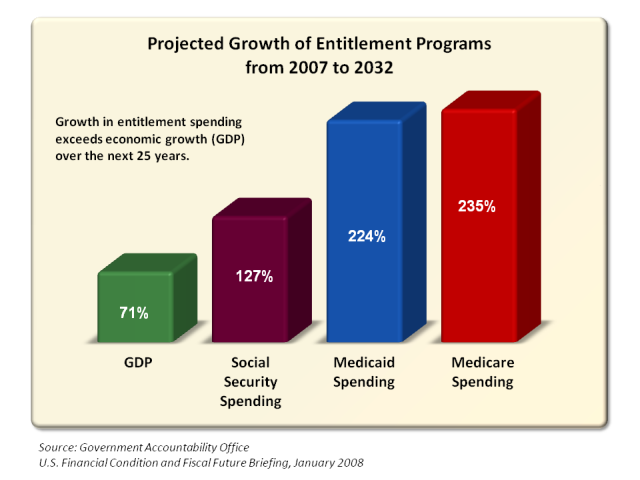James Quinn, writing at Financial Sense, gives an overview of America's economic debacle that we are living through. A lot of it has been said before (and ignored by our political overlords), but Quinn points to one element in the Great Downfall that few of any persuasion want to acknowledge: the role of institutionalized "compassion." Quinn says:
A nation of 310 million people cannot be governed based on emotional sob stories, but this is the tactic used by liberals to enact ever more entitlements and safety nets without consideration of cost. Steven F. Hayward describes the liberal mindset:Compassion is a virtue, but it is a human virtue. Only people can have compassion. Governments cannot have compassion, any more than governments can feel love or tenderness. State institutions exist, by their intrinsic nature, to give their administrators access to the public purse and aggrandize their power. The best the public sector can do for those who need help is provide a safe, orderly, and reasonably efficient framework for individuals to make the most of their abilities, so they will not normally need compassion.
“Liberalism’s irrepressible drive for an ever larger welfare state without limit arises from at least two premises upon which the left no longer reflects: the elevation of compassion to a political principle (albeit with other people’s money) and the erosion of meaningful constitutional limits on government on account of the imperatives of the idea of Progress.”
True, people can suffer through no fault of their own — illness, accidents, the physical deterioration of old age; arguably, even stupidity is a congenital handicap, not a moral quality. A compassionate society (that is, one that encourages individuals to be compassionate) will find ways to help them, and those ways will sometimes involve government institutions.
But that's a far cry from turning every need into, as Hayward says, a political principle. "Compassion" then becomes a trump card, an emotional argument that overrides any other consideration. The Left in particular no longer has to show how any program works in the big picture, rather than just for one group on which the "disadvantaged" label is bestowed.
Emotion based sob stories always overcome rational debate, discussions of cost, and overall impact on society. The problem with making decisions with long term fiscal implications based upon compassion only is that you will run out of money before you run out of compassion. Author William Voegeli points out that there is no end to the liberal compassion-fest:But even that's not the whole story. Mission creep is inseparable from government activity. Ever more client needs must be found — some would say created. The reductio ad absurdum, catastrophic for fiscal (as well as ethical) responsibility, is that everything that would benefit someone becomes a remedy the recipient is entitled to.
"Because compassion is an emotional response rather than a moral principle, it defeats every attempt to make wise choices about which sufferers do and don't deserve governmentally dispensed solace."
For the liberal mentality, it isn't necessary to show that society as a whole would benefit. It isn't even necessary to show that the recipient would benefit in the long run. All that matters is that someone would feel better at this moment. Vote some more largesse! Create a new department to dole it out!
As Quinn says, "The more programs that are created and expanded the larger the constituency for never ending the program. There is no example in the history of the country where a program has been deemed a failure and scrapped. Entitlement programs never die. The current lot of myopic, bought by special interests politicians do not have the guts to cut or even reduce the growth rate of entitlements."
Look at this poor woman. Her day care center's funding has been reduced. It might even have to close. Woe, woe! She has five kids, none of them with a father who found it worth his time to stick around. What will she do with the kids if she can't drop them off at the day care center while she's working at the dollar store?
She's in a fix, all right. But she's in a fix largely because of previous "compassion." No one ever asked her to breed responsibly, or not breed at all until she was in position to raise kids right. Never mind; for the government breedy is needy.
I'm not saying the woman or her kids should be left to their fates without a helping hand. I'm saying we should stop producing situations like this and demanding that others, who may be in better shape because they worked, saved, and planned (and who might have troubles of their own) pay for it.
Perhaps all this wouldn't matter so much, except on moral grounds, if money grew on trees. For some people, especially those in the government ruling class, it has long seemed as if wealth was infinite — one of the few natural resources not needing conservation. But it's mistaken to blame our present end stage economy entirely on government. Not only have the majority of Americans enabled its folly, but they have themselves morphed from citizens into consumers.
The only way for a country to achieve long-term growth is for its citizens to save more than they earn. These savings can then be invested within the country to insure that prosperity would continue for future generations. A country of only consumers will eventually collapse under the weight of debt and lack of investment.There is still time, brothers and sisters. But not much.
Two generations of Americans have been brought up to believe they are owed a pension, owed tax subsidized housing, owed free healthcare and owed the right to happiness provided by Big Brother. The conviction that government can coddle and provide for all the underachievers, disadvantaged and un-ambitious in society has taken root like a weed. This belief is a fallacy.







1 comment:
Who will be kind to the cruel must be cruel to the kind.
Post a Comment